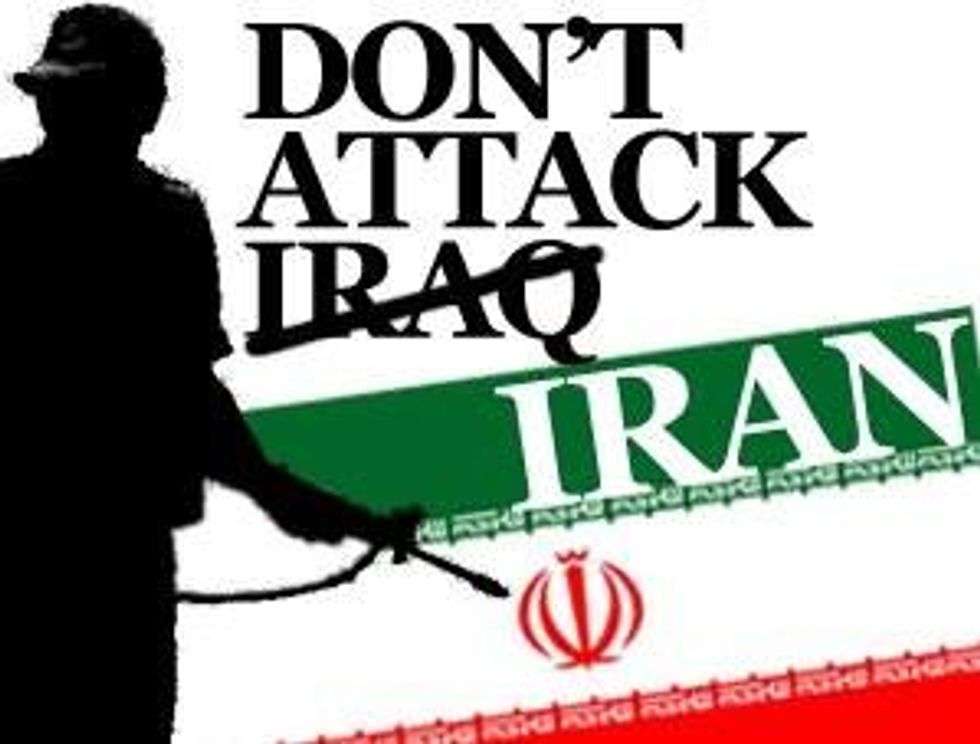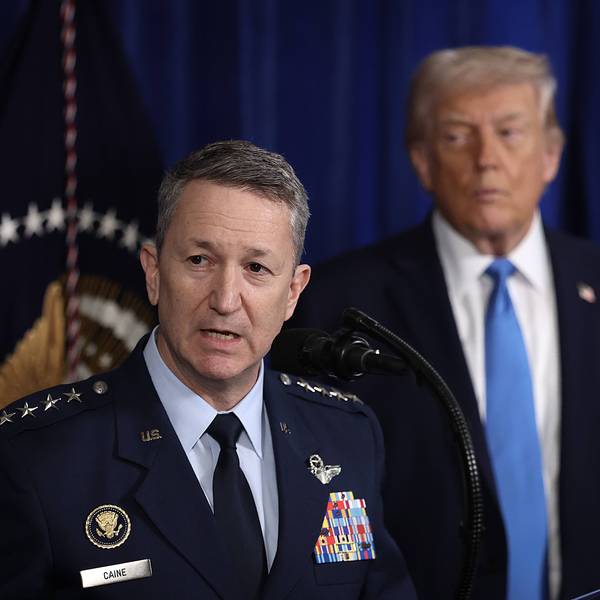Not Another War! Why Attacking Iran Would Be Untold Disaster
Do the people of the United States really want perpetual warfare? Just as we are struggling to extricate ourselves from cruel, expensive, and unnecessary wars in Iraq and Afghanistan, our country is hurtling towards another even more disastrous conflagration, this time with Iran. Iran is not a small, backward, or feeble country. It has over 78 million people (ranking 18th among nations), is 71 percent urban, and enjoys a life expectancy of over 70 years. Iranians are 84 percent literate, 1.8 million attend universities (60 percent are women), and they have a GDP per capita of over $12,000.

Although Iran (formerly called Persia) has not made a serious attack on another country for at least 200 years, it does possess a formidable military with over half a million regular armed forces and some three million combat capable reserves. It also deploys short and medium range missiles, and has developed "swarming tactics" by which numerous small fast boats neutralize technologically superior naval forces. After suffering a surprise attack by Iraq in 1980, Iran showed it could recover quickly from initial defeat and repulse a better-armed enemy. Although large numbers of Iranians despise the current government, a gratuitous attack on the motherland would surely provoke a unified and determined nationalist response. It would also guarantee Iran the sympathy and support of Islamic and Third World people everywhere.
All this indicates that an attack upon Iran would be anything but a cakewalk. A recent historian of modern Iran (Professor Ervand Abrahamian) concludes that such aggression "could easily escalate into a catastrophe on the magnitude of Europe's Thirty Years War."
Why is there danger of war with Iran? The basic reasons are two-fold. The United States has never accepted the Islamic Revolution of 1979 which ousted Shah Mohammad Pahlavi. The Shah was a repressive dictator, but a close American ally installed in 1953 by a CIA organized military coup. Ever since the Islamic Revolution of 1979, US administrations have preferred punishing Iran in various ways rather than engaging in honest diplomacy to resolve conflicts. The American invasions of Iraq and Afghanistan have, entirely unintentionally, strengthened the position of Iran by devastating its regional rivals. Washington now fears that enhanced Iranian power (combined with the Arab Spring) will eventually undermine U.S. control of energy resources in the Middle East and, in particular, will destabilize the reactionary, but utterly faithful, U.S. client regime in oil rich Saudi Arabia.
The second reason for the danger of war with Iran is Israel. The state of Israel, engorged by bountiful U.S. military aid, is currently the pint-sized bully of the Middle East. It has dispossessed the indigenous population of Palestinian and it selectively assassinates their leaders. It periodically attacks neighboring countries and maintains a large but unacknowledged nuclear arsenal. Israel dearly wants to continue as the dominant power of the Middle East and fears that Iranian ascendance will challenge this coveted status. Tel Aviv argues that Iran's nuclear program constitutes an "existential threat" but this claim is surely bogus. Iran is not producing nuclear weapons and Israel is entirely able to deter any conceivable Iranian nuclear attack. Netanyahu's belligerent war rhetoric could be a bluff intended to make the United States even more aggressive towards Iran.
A war with Iran would be an economic and political disaster and, unfortunately, this is no hyperbolism. Such a war would escalate the price of oil and sabotage our tepid economic recovery from the recent recession. It would enormously elevate our perilously high national debt, and it could terminate the role of the dollar as the world's reserve currency. Even more fundamentally, if human society has any chance of surviving the combined dangers of nuclear warfare and climatic catastrophe, it must be through the rule of robust international law. A preemptive attack upon Iran utterly shreds international law and grossly violates elementary concepts of justice. It thereby endangers not only the Middle East, but also the long-term survival of the human community.
An Urgent Message From Our Co-Founder
Dear Common Dreams reader, The U.S. is on a fast track to authoritarianism like nothing I've ever seen. Meanwhile, corporate news outlets are utterly capitulating to Trump, twisting their coverage to avoid drawing his ire while lining up to stuff cash in his pockets. That's why I believe that Common Dreams is doing the best and most consequential reporting that we've ever done. Our small but mighty team is a progressive reporting powerhouse, covering the news every day that the corporate media never will. Our mission has always been simple: To inform. To inspire. And to ignite change for the common good. Now here's the key piece that I want all our readers to understand: None of this would be possible without your financial support. That's not just some fundraising cliche. It's the absolute and literal truth. We don't accept corporate advertising and never will. We don't have a paywall because we don't think people should be blocked from critical news based on their ability to pay. Everything we do is funded by the donations of readers like you. Will you donate now to help power the nonprofit, independent reporting of Common Dreams? Thank you for being a vital member of our community. Together, we can keep independent journalism alive when it’s needed most. - Craig Brown, Co-founder |
Do the people of the United States really want perpetual warfare? Just as we are struggling to extricate ourselves from cruel, expensive, and unnecessary wars in Iraq and Afghanistan, our country is hurtling towards another even more disastrous conflagration, this time with Iran. Iran is not a small, backward, or feeble country. It has over 78 million people (ranking 18th among nations), is 71 percent urban, and enjoys a life expectancy of over 70 years. Iranians are 84 percent literate, 1.8 million attend universities (60 percent are women), and they have a GDP per capita of over $12,000.

Although Iran (formerly called Persia) has not made a serious attack on another country for at least 200 years, it does possess a formidable military with over half a million regular armed forces and some three million combat capable reserves. It also deploys short and medium range missiles, and has developed "swarming tactics" by which numerous small fast boats neutralize technologically superior naval forces. After suffering a surprise attack by Iraq in 1980, Iran showed it could recover quickly from initial defeat and repulse a better-armed enemy. Although large numbers of Iranians despise the current government, a gratuitous attack on the motherland would surely provoke a unified and determined nationalist response. It would also guarantee Iran the sympathy and support of Islamic and Third World people everywhere.
All this indicates that an attack upon Iran would be anything but a cakewalk. A recent historian of modern Iran (Professor Ervand Abrahamian) concludes that such aggression "could easily escalate into a catastrophe on the magnitude of Europe's Thirty Years War."
Why is there danger of war with Iran? The basic reasons are two-fold. The United States has never accepted the Islamic Revolution of 1979 which ousted Shah Mohammad Pahlavi. The Shah was a repressive dictator, but a close American ally installed in 1953 by a CIA organized military coup. Ever since the Islamic Revolution of 1979, US administrations have preferred punishing Iran in various ways rather than engaging in honest diplomacy to resolve conflicts. The American invasions of Iraq and Afghanistan have, entirely unintentionally, strengthened the position of Iran by devastating its regional rivals. Washington now fears that enhanced Iranian power (combined with the Arab Spring) will eventually undermine U.S. control of energy resources in the Middle East and, in particular, will destabilize the reactionary, but utterly faithful, U.S. client regime in oil rich Saudi Arabia.
The second reason for the danger of war with Iran is Israel. The state of Israel, engorged by bountiful U.S. military aid, is currently the pint-sized bully of the Middle East. It has dispossessed the indigenous population of Palestinian and it selectively assassinates their leaders. It periodically attacks neighboring countries and maintains a large but unacknowledged nuclear arsenal. Israel dearly wants to continue as the dominant power of the Middle East and fears that Iranian ascendance will challenge this coveted status. Tel Aviv argues that Iran's nuclear program constitutes an "existential threat" but this claim is surely bogus. Iran is not producing nuclear weapons and Israel is entirely able to deter any conceivable Iranian nuclear attack. Netanyahu's belligerent war rhetoric could be a bluff intended to make the United States even more aggressive towards Iran.
A war with Iran would be an economic and political disaster and, unfortunately, this is no hyperbolism. Such a war would escalate the price of oil and sabotage our tepid economic recovery from the recent recession. It would enormously elevate our perilously high national debt, and it could terminate the role of the dollar as the world's reserve currency. Even more fundamentally, if human society has any chance of surviving the combined dangers of nuclear warfare and climatic catastrophe, it must be through the rule of robust international law. A preemptive attack upon Iran utterly shreds international law and grossly violates elementary concepts of justice. It thereby endangers not only the Middle East, but also the long-term survival of the human community.
Do the people of the United States really want perpetual warfare? Just as we are struggling to extricate ourselves from cruel, expensive, and unnecessary wars in Iraq and Afghanistan, our country is hurtling towards another even more disastrous conflagration, this time with Iran. Iran is not a small, backward, or feeble country. It has over 78 million people (ranking 18th among nations), is 71 percent urban, and enjoys a life expectancy of over 70 years. Iranians are 84 percent literate, 1.8 million attend universities (60 percent are women), and they have a GDP per capita of over $12,000.

Although Iran (formerly called Persia) has not made a serious attack on another country for at least 200 years, it does possess a formidable military with over half a million regular armed forces and some three million combat capable reserves. It also deploys short and medium range missiles, and has developed "swarming tactics" by which numerous small fast boats neutralize technologically superior naval forces. After suffering a surprise attack by Iraq in 1980, Iran showed it could recover quickly from initial defeat and repulse a better-armed enemy. Although large numbers of Iranians despise the current government, a gratuitous attack on the motherland would surely provoke a unified and determined nationalist response. It would also guarantee Iran the sympathy and support of Islamic and Third World people everywhere.
All this indicates that an attack upon Iran would be anything but a cakewalk. A recent historian of modern Iran (Professor Ervand Abrahamian) concludes that such aggression "could easily escalate into a catastrophe on the magnitude of Europe's Thirty Years War."
Why is there danger of war with Iran? The basic reasons are two-fold. The United States has never accepted the Islamic Revolution of 1979 which ousted Shah Mohammad Pahlavi. The Shah was a repressive dictator, but a close American ally installed in 1953 by a CIA organized military coup. Ever since the Islamic Revolution of 1979, US administrations have preferred punishing Iran in various ways rather than engaging in honest diplomacy to resolve conflicts. The American invasions of Iraq and Afghanistan have, entirely unintentionally, strengthened the position of Iran by devastating its regional rivals. Washington now fears that enhanced Iranian power (combined with the Arab Spring) will eventually undermine U.S. control of energy resources in the Middle East and, in particular, will destabilize the reactionary, but utterly faithful, U.S. client regime in oil rich Saudi Arabia.
The second reason for the danger of war with Iran is Israel. The state of Israel, engorged by bountiful U.S. military aid, is currently the pint-sized bully of the Middle East. It has dispossessed the indigenous population of Palestinian and it selectively assassinates their leaders. It periodically attacks neighboring countries and maintains a large but unacknowledged nuclear arsenal. Israel dearly wants to continue as the dominant power of the Middle East and fears that Iranian ascendance will challenge this coveted status. Tel Aviv argues that Iran's nuclear program constitutes an "existential threat" but this claim is surely bogus. Iran is not producing nuclear weapons and Israel is entirely able to deter any conceivable Iranian nuclear attack. Netanyahu's belligerent war rhetoric could be a bluff intended to make the United States even more aggressive towards Iran.
A war with Iran would be an economic and political disaster and, unfortunately, this is no hyperbolism. Such a war would escalate the price of oil and sabotage our tepid economic recovery from the recent recession. It would enormously elevate our perilously high national debt, and it could terminate the role of the dollar as the world's reserve currency. Even more fundamentally, if human society has any chance of surviving the combined dangers of nuclear warfare and climatic catastrophe, it must be through the rule of robust international law. A preemptive attack upon Iran utterly shreds international law and grossly violates elementary concepts of justice. It thereby endangers not only the Middle East, but also the long-term survival of the human community.

